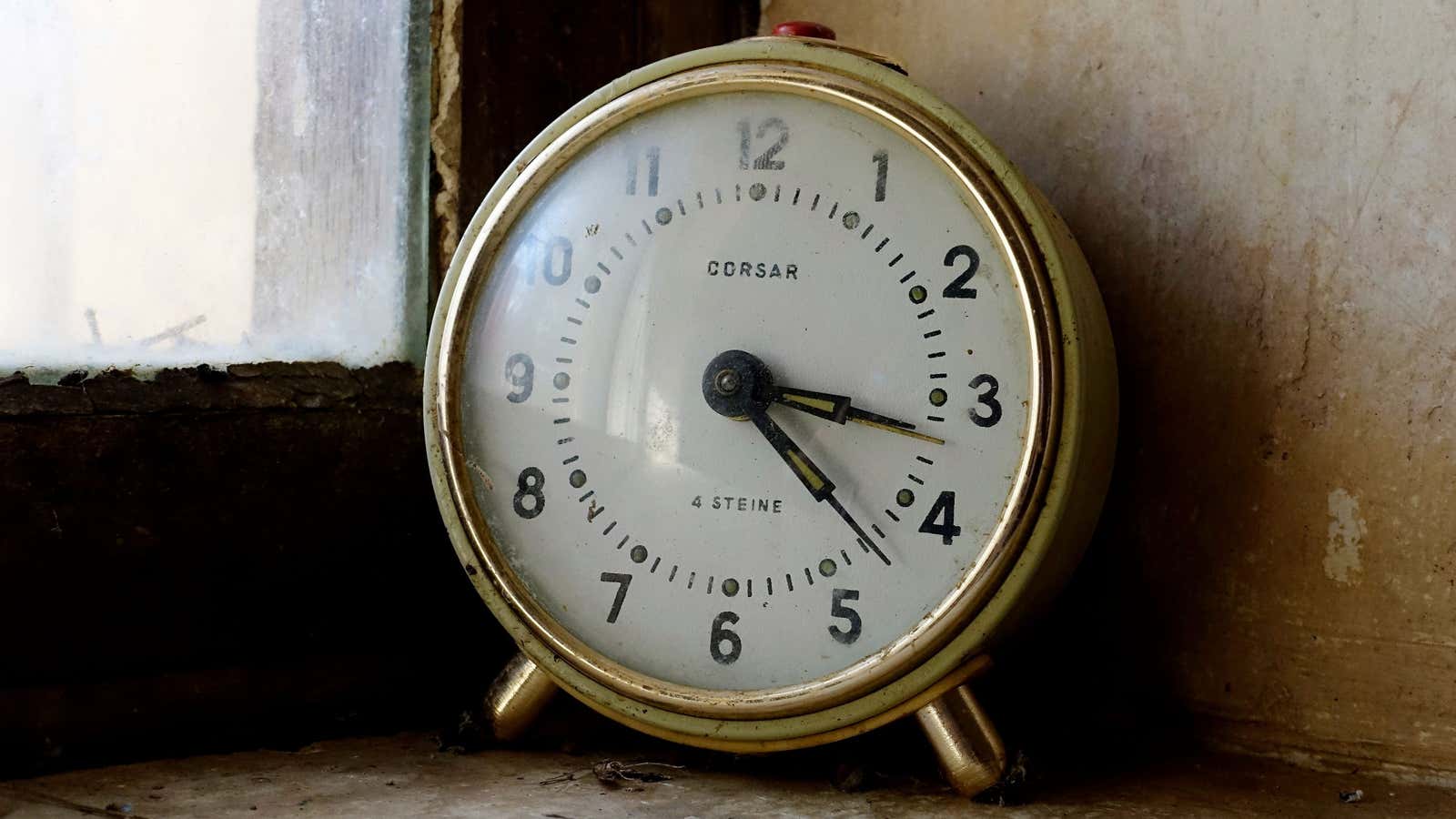A lot of successful people seem to have incredibly punishing morning routines. I enjoy mornings naturally, but for years I also tried to pack them with achievements. I’d wake up at 6am to swim or run before work, arriving at the office early and eating breakfast there. It felt good in some ways: I got lots of exercise and a burst of energy right away.
Then I met my partner, David, who woke up every morning at exactly 8am—without an alarm. As couples’ habits tend to converge, I got into his routine, too, and realized just how jolting and anxious alarms were as a way to start my day.
Alarms that jerk you out of deep sleep aren’t good for your health. The grogginess that comes with being rudely awakened is called sleep inertia. It impairs your mental function and lasts longer in people who have been sleep-deprived or woken from deep sleep. Messing up your internal clock has also been linked with obesity. If nothing else, it makes the first moment of every day an unwelcome one.
David, by contrast, seemed mentally awake immediately, fully rested, and had laser focus throughout his work day. And I found that the psychological benefits of changing my routine were great: Imagine the refreshed, expectant feeling of waking in the quiet of a Saturday morning in the countryside, but every day.
The big trick to teaching yourself to wake up without an alarm is ultra-simple: Acknowledge how much sleep you truly need. (According to sleep scientist Daniel Gartenberg, assistant adjunct professor in biobehavioral health at Penn State, we should be aiming for 8.5 hours.) Then count backwards to figure out what time you need to go to bed in order to get the right amount of sleep. After you get into bed, and before you fall asleep, tell yourself what time to wake up.
For some people, that’s all you’ll need to wake up alarm-free. But if you need a little extra help, there’s more to try. Sleep experts suggest establishing a night routine where you spend the last hour before bed relaxing, with dimmed lights and no screens. In the morning, make sure some daylight can get into your room—we never used blackout blinds. And have something pleasurable to motivate you to get out of bed, whether it’s a hot shower, some morning stretches, or a cup of tea. It’s also a good idea to go to bed—and wake up—at the same time every day, so your body gets used to a routine.
The no-alarm method is a common-sense alternative to all the articles about how waking up early can make us more productive. Sleep scientists say that what’s really key for our mental and physical health isn’t what time we wake up, but that we get enough sleep.
There are many ways to maximize productivity with different schedules and hacks. But fundamentally, we’re animals that need to rest so that we can hunt, gather, look after our young, and use Excel effectively. The other thing sleep science teaches us is that circadian rhythms—the body’s internal pattern of sleepiness and energy—should be respected. Waking without an alarm means you’ll be waking up towards the end of a cycle, when your sleep is lightest. That makes it easier to slip seamlessly into consciousness without painful effort.
Waking up without an alarm comes with some tradeoffs. I had to fit exercise into other parts of my week, and I started working from home more often in the mornings since I was waking up a bit later overall. I’d also still set an alarm for an earlier wakeup sometimes, but only if there was a great reason, like a flight or some other adventure.
Then we had a baby: A personalized, cute, but demanding alarm clock. I’m now functioning on less rest than ever before. Opening my eyes to the beautiful blankness that follows adequate, unbroken sleep is just a memory. But if, on some distant day, it’s possible to set my own sleep schedule again, I’ll be wary of alarms. If I haven’t given birth to it, I’ll be hesitant to let it take away that precious morning moment.
